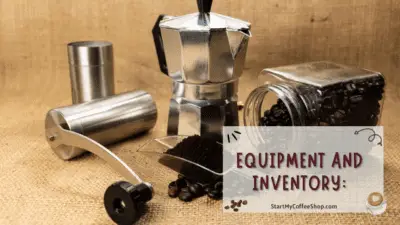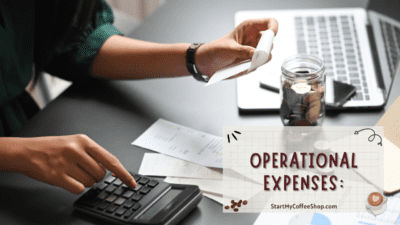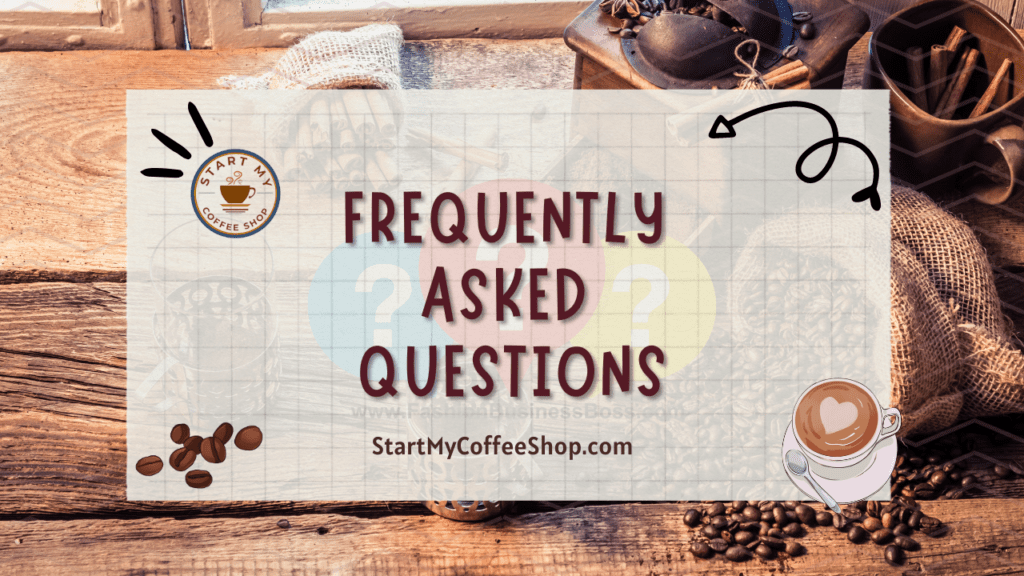If you’re a coffee lover with an entrepreneurial spirit, opening a Dunkin’ coffee shop can be an exciting venture. However, it’s crucial to understand the costs involved in starting such a business.
Starting a Dunkin’ coffee shop can range from $150,000 to over $2 million, including franchise fees, real estate, equipment, inventory, training, marketing, and operational expenses. Thorough planning and budgeting are crucial for a significant venture.
In this article, I will delve into the various expenses you can expect when launching a Dunkin’ coffee shop.
1. Franchise Fee and Initial Investment:
When embarking on the journey to open a Dunkin’ coffee shop, two critical financial aspects must be carefully evaluated: the franchise fee and the initial investment. The franchise fee acts as an entry ticket into the Dunkin’ family and can vary from $40,000 to $90,000. However, the specific amount hinges on variables like the shop’s location and the size of the market it serves.
Moreover, the initial investment encompasses a wide array of essential elements necessary for running a coffee shop. This investment covers various expenses, such as equipment procurement, signage installation, inventory acquisition, and other crucial aspects. The range of initial investment for a Dunkin’ coffee shop spans from $109,700 to $1,637,700.
The initial investment cost depends on several factors, including the size of the shop, geographical location, and the specific requirements of the target market. Smaller, more compact locations with limited seating arrangements tend to fall towards the lower end of the investment spectrum, while larger establishments in prime locations with more extensive seating areas and a broader customer base tend to demand more substantial initial investment.
It is important to note that these figures provide a general estimate, and the actual costs may vary based on individual circumstances. Conducting thorough research, creating a detailed business plan, and consulting with Dunkin’ representatives are crucial steps to gaining a precise understanding of the financial requirements for opening a Dunkin’ coffee shop.
2. Real Estate and Leasehold Improvements:
The cost of real estate for your shop can fluctuate significantly, influenced by factors such as the location’s desirability, size, and demand within the local market. Urban areas or prime locations may come with a higher price tag due to their accessibility and visibility.
Leasehold improvements are an important consideration when setting up your coffee shop. These improvements entail renovating the interior space to align with Dunkin’s brand standards and create a welcoming atmosphere for customers.
The costs associated with leasehold improvements can range from $100,000 to $600,000, depending on the extent of renovations, the condition of the space, and the desired level of customization. These expenses typically cover elements such as flooring, lighting, painting, fixtures, furniture, and equipment installation.
It is crucial to incorporate these expenses into your budgeting process when planning to open a Dunkin’ coffee shop. Allocating sufficient funds for real estate costs and leasehold improvements ensures that you have a well-prepared and visually appealing space that aligns with Dunkin’s brand image.
To optimize your investment, it is advisable to conduct thorough market research and seek expert advice to identify areas with high foot traffic, competitive advantages, and a target customer base that aligns with Dunkin’s offerings. A strategic location coupled with appealing leasehold improvements can enhance your chances of attracting and retaining customers, ultimately contributing to the long-term progress of your Dunkin’ coffee shop.
3. Equipment and Inventory:

Running a Dunkin’ coffee shop smoothly and efficiently requires investing in a range of essential equipment. These include coffee machines, blenders, ovens, refrigeration units, and point-of-sale systems.
The cost of equipment can vary depending on factors such as the size of your shop, the volume of customers you expect to serve, and the specific equipment brands and models you choose. On average, the cost of equipment for a Dunkin’ coffee shop can range from $100,000 to $400,000.
In addition to equipment, you will also need to purchase an initial inventory of coffee beans, baked goods, and other supplies to meet the demands of your customers. The amount of inventory needed will depend on various factors, including your projected sales volume and customer demand.
It’s crucial to strike a balance between having enough inventory to meet customer needs without excessive waste. Proper inventory management will help optimize costs and ensure product freshness.
To determine the appropriate inventory levels, it is essential to conduct market research and analyze the expected customer traffic in your specific location. By understanding customer preferences and local demand, you can estimate the quantities of coffee beans, baked goods, and other supplies required to meet customer expectations while minimizing waste.
Read more about Best Grinder Coffee Maker: Elevating Your Coffee Experience
4. Training and Licensing:
Dunkin’ understands the importance of providing comprehensive training to its franchisees and their employees to uphold its brand standards and deliver exceptional service. The cost of training can vary depending on the level of support required and the specific training programs chosen. On average, the cost of training for a Dunkin’ coffee shop ranges from $5,000 to $20,000.
Allocating a budget for training expenses is crucial to ensure that you and your staff are equipped with the knowledge and skills necessary to operate a Dunkin’ coffee shop effectively. The training programs offered by Dunkin’ cover various aspects, including operations, customer service, product preparation, and management skills.
These programs aim to ensure that you and your team are well-prepared to handle the day-to-day operations of the coffee shop and deliver a consistent and positive customer experience.
Investing in training not only enhances the expertise and proficiency of your staff but also fosters a strong connection to Dunkin’s brand values and quality standards. It helps create a unified and motivated team that can deliver the high level of service expected from a Dunkin’ coffee shop.
When planning your budget, it’s important to consider training expenses as an essential part of your initial investment. Consulting with Dunkin’ representatives will provide you with a better understanding of the training programs available and their associated costs.
5. Marketing and Advertising:
Digital advertising has become increasingly important in today’s digital landscape. Investing in online marketing channels such as social media advertising, search engine optimization (SEO), and pay-per-click (PPC) advertising can help increase your online visibility and drive traffic to your coffee shop’s website or social media profiles.
The cost of digital advertising can vary depending on the scope and complexity of your campaigns, but it is typically a worthwhile investment to expand your reach and attract potential customers.
Traditional advertising methods, such as print media and signage, still hold value in specific markets. Placing ads in local newspapers or magazines, along with strategically placed signage, can help raise awareness among the local community. The cost of print media and signage will depend on the size and frequency of the ads and the location where they are placed.
Local promotions, including community events, partnerships with other local businesses, and special offers, are effective ways to engage with your target audience and foster a sense of community. While the cost of these promotions can vary, they often provide a solid return on investment by driving foot traffic and generating positive word-of-mouth.
When budgeting for marketing and advertising expenses, it is advisable to allocate between $10,000 and $50,000 per year, depending on your specific location and the level of competition in your market. It’s important to continually assess the performance of your marketing efforts and adjust your strategy accordingly to optimize your return on investment.
Collaborating with marketing professionals and leveraging Dunkin’s marketing resources and guidance can help you develop an effective marketing plan tailored to your coffee shop’s unique needs. By investing in strategic marketing initiatives, you can increase brand visibility, attract new customers, and build a loyal customer base for your Dunkin’ coffee shop.
6. Operational Expenses:

When running a coffee shop, it’s crucial to consider the ongoing operational expenses that are part of your day-to-day business. These expenses encompass various aspects and should be factored into your budget to ensure financial stability.
Rent is one of the significant operational expenses and will largely depend on the location and size of your coffee shop. Prime locations or areas with high foot traffic often come with higher rental costs, while less central or smaller locations may be more affordable. It’s important to carefully evaluate potential locations and negotiate favorable lease terms to manage this expense effectively.
Utilities such as electricity, water, and internet services are necessary to keep your coffee shop up and running. These costs can vary depending on the size of your space, the equipment you use, and local utility rates. Implementing energy-efficient practices and equipment can help reduce utility expenses in the long run.
Employee wages are another critical operational expense. It’s important to budget for competitive wages to attract and retain skilled and motivated staff members. The number of employees you require will depend on the size of your coffee shop, the volume of customers, and the services you offer. Additionally, factors such as minimum wage laws and any applicable benefits should be considered when estimating employee wage costs.
Insurance coverage is essential to protect your business from unforeseen events or liabilities. The insurance cost will depend on factors such as the size of your coffee shop, the type of coverage needed, and your location. It’s important to consult with insurance professionals to assess the appropriate coverage for your specific business needs.
Permits and licenses are necessary to comply with local regulations and ensure the legal operation of your coffee shop. The costs associated with permits and licenses can vary depending on your location and the specific requirements of your local government authorities.
General maintenance costs, including repairs and upkeep, should also be taken into account. Regular maintenance of equipment, furniture, and the overall premises is necessary to provide your customers with a clean and inviting environment. It’s advisable to allocate a portion of your budget to cover these ongoing maintenance expenses.
Read more about Best Nespresso Coffee Machine: Discovering the Best Nespresso Coffee Machine on the Market
7. Contingency Fund and Working Capital:
A contingency fund acts as a safety net, allowing you to address unforeseen circumstances without jeopardizing the financial stability of your business. These unexpected expenses could include equipment breakdowns, repairs, or unexpected changes in market conditions.
Experts recommend setting aside a contingency fund equivalent to at least six months of expenses. This ensures that you have sufficient funds to cover unexpected costs and maintain business continuity.
In addition to the contingency fund, maintaining adequate working capital is essential for the ongoing operations of your coffee shop. Working capital refers to the funds available to cover your daily expenses, such as inventory replenishment, employee wages, rent, utilities, and marketing costs. It provides the necessary liquidity to meet your financial obligations and seize growth opportunities.
To determine the appropriate amount of working capital, it’s crucial to conduct a thorough analysis of your projected expenses and revenue streams. Consider factors such as seasonal fluctuations, industry trends, and your business’s specific needs. Aim to have a working capital equivalent to at least six months of expenses to ensure a healthy cash flow and flexibility in managing day-to-day operations.
By establishing a contingency fund and maintaining sufficient working capital, you can mitigate financial risks and position your coffee shop for long-term growth. It’s advisable to work closely with financial advisors or consultants to determine the optimal amount for both the contingency fund and working capital based on your specific business circumstances.
Summary
Opening a Dunkin’ coffee shop is an exciting endeavor that requires careful financial planning. By considering the various costs involved, from the franchise fee and initial investment to operational expenses and marketing, you can set realistic expectations and make informed decisions.
Remember, thorough research, effective budgeting, and a passion for coffee will help you navigate the challenges and embark on an excellent journey as a Dunkin’ coffee shop owner. Good luck!
Frequently Asked Questions

Question: How much does it cost to lease a suitable location for a Dunkin’ coffee shop?
Answer: Lease expenses typically range from several thousand dollars to tens of thousands of dollars per month.
Question: What kind of equipment is needed to start a Dunkin’ coffee shop, and how much does it cost?
Answer: To run a Dunkin’ coffee shop, you’ll need equipment such as coffee machines, blenders, ovens, refrigeration units, and point-of-sale systems. The cost of equipment can range from $100,000 to $400,000.
Question: How much should I allocate for marketing and advertising expenses?
Answer: Consider allocating between $10,000 and $50,000 per year for marketing initiatives such as digital advertising, print media, signage, and local promotions.
To learn more on how to start your own coffee shop checkout my startup documents here
Please note: This blog post is for educational purposes only and does not constitute legal advice. Please consult a legal expert to address your specific needs.

Hi! I’m Shawn Chun
My adventure in coffee began when I first launched my first coffee shop back in the early 2000s. I had to figure out so many things on my own and to make it worse within 2 years of opening two large corporate coffee chains moved in just blocks away from me!
As I saw smaller and even some larger coffee shops in the neighborhood slowly lose customers to these giant coffee chains and slowly close up shop, I knew that I had to start getting creative…or go out of business.
I (like you may be) knew the coffee industry well. I could make the best latte art around and the foam on my caps was the fluffiest you have ever seen. I even had the best state-of-the-art 2 group digital Nuova Simonelli machine money could buy. But I knew that these things alone would not be enough to lure customers away from the name brand established coffee shops.
Eventually, through lots of trial and error as well as perseverance and creativity I did find a way to not only survive but also thrive in the coffee/espresso industry even while those corporate coffee chains stayed put. During those years I learned to adapt and always faced new challenges. It was not always easy, however, in the end, I was the sole survivor independent coffee shop within a 10-mile radius of my location. Just two corporate coffee chains and I were left after that year. All told the corporate coffee chains took down over 15 small independent coffee shops and kiosks and I was the last one standing and thriving.
Along the years I meet others with the same passion for coffee and I quickly learned that it is not only “how good a barista is” that makes a coffee shop successful, but the business side of coffee as well.
Hence why I started this website you are on now. To provide the tools and resources for up and coming coffee shop owners to gain that vital insight and knowledge on how to start a coffee shop successfully.
Stick around, browse through my helpful blog and resources and enjoy your stay! With lots of LATTE LOVE!
Shawn







